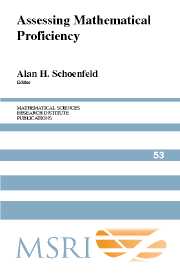Book contents
- Frontmatter
- Contents
- Preface
- Acknowledgments
- Section 1 The Big Picture
- Section 2 Perspectives on Mathematical Proficiency
- Section 3 What Does Assessment Assess? Issues and Examples
- Section 4 The Case of Algebra
- Section 5 What Do Assessments Assess? The Case of Fractions
- Section 6 The Importance of Societal Context
- Epilogue: What Do We Need to Know? Items for a Research Agenda
- About the Authors
- Subject Index
- Author Index
- Task Index
Section 4 - The Case of Algebra
Published online by Cambridge University Press: 06 July 2010
- Frontmatter
- Contents
- Preface
- Acknowledgments
- Section 1 The Big Picture
- Section 2 Perspectives on Mathematical Proficiency
- Section 3 What Does Assessment Assess? Issues and Examples
- Section 4 The Case of Algebra
- Section 5 What Do Assessments Assess? The Case of Fractions
- Section 6 The Importance of Societal Context
- Epilogue: What Do We Need to Know? Items for a Research Agenda
- About the Authors
- Subject Index
- Author Index
- Task Index
Summary
In this section and the next, we “crank up the microscope” to take a closer look at the examination of (a) specific subject matter, and (b) what different kinds of assessments can reveal. The subject of this section is algebra—mathematical subject matter that has always been important, but that has taken on increased importance in the U.S. in recent years. This is due to the confluence of two important social movements. The first is the “algebra for all” movement, an attempt to equalize opportunity-to-learn in American schools. In the past, many high school students were placed in courses such as “business mathematics” instead of algebra, or stopped taking mathematics altogether. Lack of access to algebra narrowed their options, both in curriculum and in employment. Hence policymakers and teachers in the U.S. declared that every student should have access to high-quality mathematics instruction, including an introduction to algebra in the early high school years. The second movement is a trend toward “highstakes” testing. In various states around the nation, students must now pass state-wide assessments in mathematics in order to graduate from high school. Given that algebraic skills are now considered to be a part of quantitative literacy (as in “algebra for all”), state exams often focus on algebra as the gateway to high school graduation. In California, for example, the state's High School Exit Examination (the CAHSEE) in mathematics focuses largely on algebra.
- Type
- Chapter
- Information
- Assessing Mathematical Proficiency , pp. 155 - 156Publisher: Cambridge University PressPrint publication year: 2007



